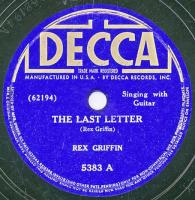
Ernest Dale Tubb, nicknamed the Texas Troubadour, was an American singer and songwriter and one of the pioneers of country music. His biggest career hit song, "Walking the Floor Over You" (1941), marked the rise of the honky tonk style of music.

"Your Cheatin' Heart" is a song written and recorded by country music singer-songwriter Hank Williams in 1952. It is regarded as one of country's most important standards. Williams was inspired to write the song while driving with his fiancée from Nashville, Tennessee, to Shreveport, Louisiana. After describing his first wife Audrey Sheppard as a "cheatin' heart", in minutes he dictated the lyrics to Billie Jean Jones. Produced by Fred Rose, Williams recorded the song at his last session at Castle Studio in Nashville, Tennessee, on September 23.

The Importance of Being Ernest is an album by American country singer Ernest Tubb, released in 1959.
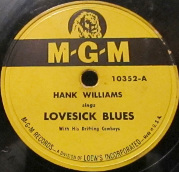
"Lovesick Blues" is a Tin Pan Alley song, composed by Cliff Friend, with lyrics by Irving Mills. It first appeared in the 1922 musical "Oh, Ernest", and was recorded that year by Elsie Clark and Jack Shea. Emmett Miller recorded it in 1925 and 1928, followed by country music singer Rex Griffin in 1939. The recordings by Griffin and Miller inspired Hank Williams to perform the song during his first appearances on the Louisiana Hayride radio show in 1948. Receiving an enthusiastic reception from the audience, Williams decided to record his own version despite initial push back from his producer Fred Rose and his band.

"I Saw the Light" is a country gospel song written by Hank Williams. Williams was inspired to write the song while returning from a concert by a remark his mother made while they were arriving in Montgomery, Alabama. He recorded the song during his first session for MGM Records, and released in September 1948. Williams' version did not enjoy major success during its initial release, but eventually it became one of his most popular songs and the closing number for his live shows. It was soon covered by other acts, and has become a country gospel standard.
This is a list of notable events in country music that took place in the year 1949.
This is a list of notable events in country music that took place in 1948.
This is a list of notable events in country music that took place in the year 1946.
This is a list of notable events in country music that took place in the year 1944.
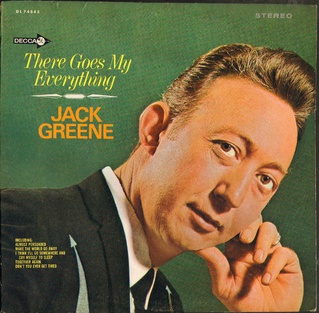
There Goes My Everything is a studio album by American country music artist Jack Greene. It was released in December 1966 on Decca Records and was produced by Owen Bradley. It was Greene's debut studio album as a recording artist after playing in the band of Ernest Tubb for several years. Three singles were included in the album. Its biggest hit was the title track, which topped the country charts in 1966 and helped jump start Greene's music career. The album itself would also reach peak positions on the Billboard country chart following its release.

Buddy Gene Emmons was an American musician who is widely regarded as the world's foremost pedal steel guitarist of his day. He was inducted into the Steel Guitar Hall of Fame in 1981. Affectionately known by the nickname "Big E", Emmons' primary genre was American country music, but he also performed jazz and Western swing. He recorded with Linda Ronstadt, Gram Parsons, The Everly Brothers, The Carpenters, Jackie DeShannon, Roger Miller, Ernest Tubb, John Hartford, Little Jimmy Dickens, Ray Price, Judy Collins, George Strait, John Sebastian, and Ray Charles and was a widely sought session musician in Nashville and Los Angeles.
"Oakie Boogie" is a Western swing dance song written by Johnny Tyler in 1947. It is recognizable by its refrain:

Alsie "Rex" Griffin was an American country musician and songwriter.

Country Favorites – Willie Nelson Style is the fourth studio album by country singer Willie Nelson. He recorded it with Ernest Tubb's band, the Texas Troubadours and Western Swing fiddler-vocalist Wade Ray with studio musicians Jimmy Wilkerson and Hargus "Pig" Robbins. At the time of the recording, Nelson was a regular on a syndicated TV show hosted by Tubb.
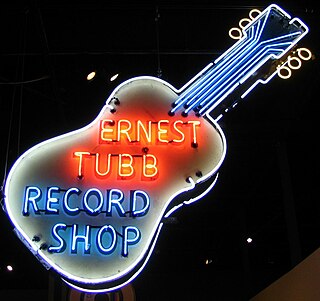
The Midnite Jamboree is a radio program that has aired on WSM in Nashville, Tennessee since May 3, 1947. It was launched by country musician Ernest Tubb. The program was recorded from Ernest Tubb Record Shop in Nashville, Tennessee each Saturday. Through a brokered programming arrangement with Ernest Tubb Record Shop, the Jamboree aired following the Grand Ole Opry; as the program's name implied, it aired at midnight Central Time.
"Walking the Floor Over You" is a country music song written by Ernest Tubb, recorded on April 26, 1941 in Fort Worth, Texas, and released in the United States that year.
"Take These Chains from My Heart" is a song by Hank Williams. It was written by Fred Rose and Hy Heath and was recorded at Williams' final recording session on September 23, 1952, in Nashville. The song has been widely praised; Williams' biographer Colin Escott deems it "perhaps the best song [Rose] ever presented to Hank...It was one of the very few songs that sounded somewhat similar to a Hank Williams song." Williams is backed by Tommy Jackson (fiddle), Don Helms, Chet Atkins, Jack Shook, and Floyd "Lightnin'" Chance (bass). In the wake of Williams' death on New Year's Day, 1953, the song shot to No. 1, his final chart-topping hit for MGM Records. Like "Your Cheatin' Heart," the song's theme of despair, so vividly articulated by Williams' typically impassioned singing, reinforced the image of Hank as a tortured, mythic figure.
"The Lord Knows I'm Drinking" is a song written by Bill Anderson, and recorded by American country music singer Cal Smith. It was released in November 1972 as the third single from the album I've Found Someone of My Own.
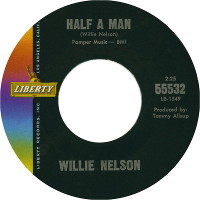
"Half a Man" is a song written and recorded by American country music singer Willie Nelson. The song was released as the A-side of the single for his second Liberty Records album, Here's Willie Nelson. Despite receiving mixed airplay for its content, the song became a sales success, peaking at number twenty-five on Billboard's Hot Country Singles and number twenty on Cashbox's country singles.
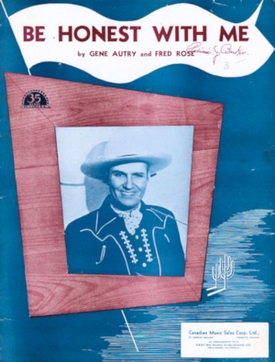
"Be Honest With Me" was a 1940 song by Gene Autry and Fred Rose. The recording by Autry was one of the big Hillbilly hits of 1941, and was nominated for the 1942 Academy Award for Best Original Song.
